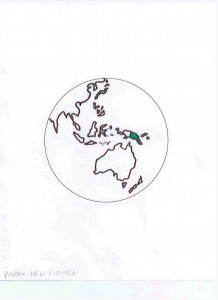PAPUA NEW GUINEA
A. THE COUNTRY
The Independent State of Papua New Guinea, a country in South East Asia
and north of Australia, occupies the eastern half of the island of New
Guinea and numerous offshore islands. It is a land of high mountains,
dense forests, lowland swamps, coral islands, torrential rainfall, many
rivers and great biodiversity. The government is a Federal
Constitutional Monarchy (Queen Elizabeth II) and a Parliamentary
Democracy. >75% of citizens survive through subsistence farming and
fishing. There are many issues in PNG including:
The vast wealth of natural resources -oil, gas, minerals and timber- is
hard to access and is plundered by foreign companies and their local
collaborators.
There is heavy dependence on aid (and trade) from Australia; endemic
corruption dissipates the bulk of foreign aid.
Ethnic diversity and geographic isolation of most groups make attempts
to mould a single national PNG identity complex. Tribal fightings and
revenge killings continue.
Accelerating urbanization intensifies pressure on the job market,
infrastructure, and social stability.
HIV infections, witchcraft, sorcery and violence are on the rise.
B. THE PEOPLE
The population is ~6,889,000 and the official languages English, Tok
Pisin (Melanesian/English Creole) and Motu.
PNG is ethnically and linguistically the world’s most complex nation
with ~830 languages, 20% of the world’s total.
~98.2% are Melanesian, ~1.8% Other (Chinese, Caucasian, Polynesian, East
and Southeast Asian, West Papuan refugees).
C. RELIGIONS AND CHRISTIANITY/PENTECOSTALISM
Over 95% self-identify as Christian, but nominalism, false teaching and
various cults in the Church – combined with the pervasive influence of
animism in many people – lead to a false assumption the PNG is
thoroughly Christianized.
~3.5% are Ethnoreligionist, ~0.3% Non-religious, ~0.25% Baha’i, ~0.05%
Buddhist, ~0.04% Muslim, ~0.02% Chinese.
In the Christian category:
~52.65% are Protestant, ~26.49% Catholic, ~12.4% Unaffiliated, ~5.89%
Independent, ~2.46% Anglican, ~2.38% are groups considered ‘marginal’.
Evangelicals represent ~25.7% of the population.
Charismatics represent ~18.1% and of those 13.3% are Pentecostals.
Donna Siemens
References:
http://en.wikipedia.org
Operation World, Jason Mandryk. Colorado Springs: Biblica Publishing, 2010.

